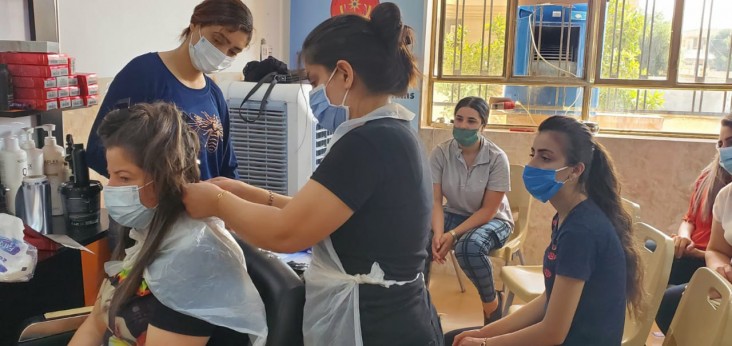Speeches Shim
One Year After NPI’s First Awards: The Impact of Hope in Iraq
After ISIS was defeated in northern Iraq, USAID committed to helping people of the region recover from the heartbreaking genocidal violence that had taken place. And they had to move quickly because of the acute need on the ground.
A complicating factor: Many of the local organizations best able to reach the people who most needed support––women who had been abused, widows, children––had not previously worked with the Agency.
Through the New Partnerships Initiative (NPI), USAID sped up the award process and in less than five months––faster than anyone thought possible––extended $4 million in funding to six new, local partners.

As we look back one year later, it is clear that these first awards under NPI not only successfully addressed immediate needs, but also served as long-term investments, giving new local partners the opportunity to build the capacity of their organizations for the future.
Through the lens of two new partners, we see how these awards offer confidence, hope, and a vision for the future to those who have experienced unimaginable trauma.
Beth Nahrain Organization for Women (BNOW)
After the liberation of the Nineveh Plain from ISIS, BNOW returned from exile in Ainkawa and reopened its Baghdede (Qaraqosh) office. The organization lost members but is actively rebuilding through workshops co-designed and funded by USAID that are helping the women of BNOW boost their own skills and knowledge, which they in turn share with others in the community. With USAID support, these courageous northern Iraqi women are gaining new job skills, providing basic support and education, creating jobs, expanding their organization, revitalizing communities, and inspiring hope.
Meriam helped organize emergency aid and an art therapy project for children when BNOW was temporarily based in Ainkawa. Since returning to Baghdede, she has helped with recovery and rebuilding projects. “Through the partnership with USAID, we have been able to focus on ourselves as a women’s organization as well as on the empowerment of women in our community,” she said. “I am proud of the women of the Nineveh Plain.”
Shlama Foundation
Demand for electricity surged when people who had been displaced returned to their homes in northern Iraq—but the region’s energy infrastructure could meet only about 40 percent of that demand, and finding gasoline was difficult. Last year, through USAID support, the Shlama Foundation began working to provide home solar systems, solar water pumps, and LED streetlights.
When the project ends next year, the humanitarian organization’s six engineers, all from different villages, want to launch their own company to continue providing solar energy in the Nineveh Plain, taking advantage of the region’s abundant sunlight as a sustainable source of energy.
The youngest of those engineers, Amina (a pseudonym), is looking forward to the project. “Not only are engineering jobs hard to come by in northern Iraq, but the projects are usually short-term,” she said.
Amina and her family fled ISIS attacks in Kirkuk and settled in Mosul, where she enrolled in Mosul University’s College of Electrical Engineering. When ISIS moved into Mosul, she had to delay her studies for a year. Now, with her diploma in hand, Amina and her fellow engineers are looking to the future.
NPI Awards in Times of Conflict and Recovery
Alana Marsili, a USAID democracy specialist and business analyst who was instrumental in launching the Iraq awards, said the team was determined to overcome all obstacles in making them. They rapidly matched community-based partners with established partners to help new partners learn about the USAID process. “There was nothing that could stop this from getting done. It’s been a really neat process to watch,” she said.
According to Marsili, keys to the program’s success included holding conversations with partners early and often; sharing clear definitions and goals; being open to providing useful resources and brainstorming best practices and solutions; and allowing new partners to serve as a bridge between the Mission, larger prime partners, and local stakeholders.
Ultimately, the Iraq awards have helped to validate NPI’s purpose—“to expand and diversify USAID’s partner base and change the way the Agency does business”—by working with local organizations.
In more ways than one, NPI awards are bringing light and hope to the people of northern Iraq.

Comment
Make a general inquiry or suggest an improvement.